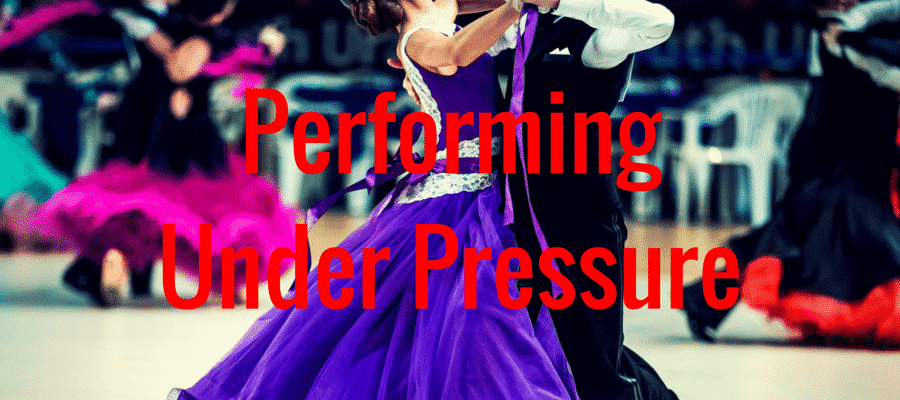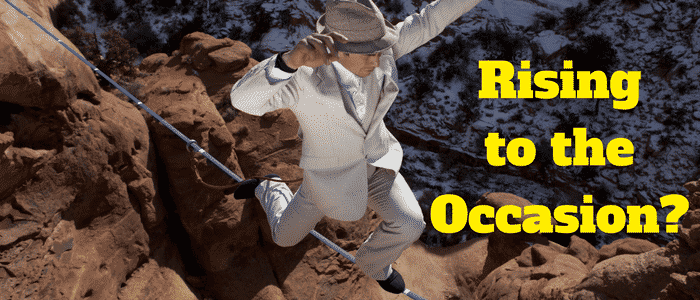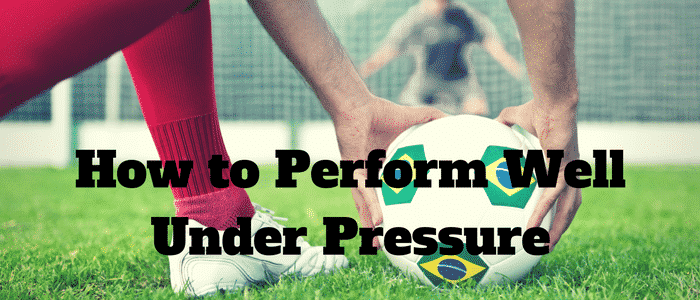
Oct 10, 2016
Recently Alice and I participated in our first national ballroom dance competition and like anything that requires you to perform in front of a live audience (public speaking anyone?) and which you are not as familiar with as making a cup of tea it provided plenty of teaching and character-building moments. After all, coal under pressure turns into diamonds.
Leading up to the event people kept mentioning it to me, making encouraging noises along the lines of “You’ll do great!”, to which I invariably pulled a grimace and expressed my doubts as to the probability of success.
When that happened to me for the about the fifth time, the day before the competition, I caught myself wondering what in the world I was doing. Would that kind of thinking, filling my mind with doubt when I should actually feel encouraged, help me succeed?
So I made a deliberate choice and decided to replace my self-doubt with certainty, if not absolute then at the least mildly confident: certain that I would do my best and certain that we would enjoy ourselves. Certain that our teachers would be supportive and that no matter what we would come out of the experience stronger. Certain that we had prepared well and that our muscle memory would safely take us through the steps.
During the dress rehearsal for our ballroom heats, despairing that I would never be able to guide us across a dance floor filled with other couples and perform all the required moves and steps (in dancing it’s the man’s responsibility to take care of this and lead the lady), I threw my hands up in the air and started complaining loudly, blaming others for the predicament I felt I was in and generally losing my cool. I felt out of my depth and under a lot of pressure.
Alice then said a very simple thing in reply: “Stop having unhelpful conversations!”
This brought me up short, bringing home to me that in times of crisis (and believe me, I had a capital letter one) we only make the situation worse by externalising by blaming others and asking questions which do not focus us on a solution.
Instead, we must have helpful conversations, taking responsibility for what’s happening right now because only then do we have the power to change it for the better, asking high-quality questions which point us in the right direction.
As the ancient Greek poet Archilocos said: “We don’t rise to the level of our expectations, we fall to the level of our training.”
That became most apparent when we stepped onto the dance floor to perform our waltz routine which we had been rehearsing for five months.
When the music started there was no time to decide what to do next or make well thought out choices – all we could do was go with the music, perform the moves we had rehearsed and refined so many times and put all our heart and soul into it. The result spoke for itself: we won the award for Best Routine Performed by a Couple.
Without anticipating what happens on the dance floor, without practising the steps and the choreography over and over again, without working out the kinks and polishing our style beyond what we thought possible – but our teachers knew we were capable of – there would not have been a well-received performance.
- Everyone knows doubt in the face of the pressure of an unfamiliar challenge: replace it with certainty. Project yourself into the challenge and feel the certainty, as you would have at some time in the past. Create a three-dimensional picture of this certainty, what you see, hear and feel, and lock it in so there is no room for anything else. Because really, doubting yourself is not going to help, is it?
- In times of pressure only have helpful conversations: take responsibility for what’s happening because only then will you have the power to change it for the better. Be clear on the outcome – to perform well in a competition for example – and when things appear to be going poorly, instead of further cratering the road you’re on, use helpful questions to construct a smooth path to that outcome.
- Practise, practise, practise! Anything you want to do well requires thorough preparation which needs time and focus. Work with people who can show you how it’s done, emulate them and ask for their feedback. Go through the steps again and again until they become second nature, because when the rubber hits the road that’s what’s going to carry the day.
Click here to listen to a Conversation with Alice where Alice and Thomas have a discussion about their recent dance competition: how we all learn new skills in different ways, why it’s important to put yourself into stressful, pressure riddled situations and how you can overcome meltdowns and performance nerves.
Alice Haemmerle, on whose knowledge and experience as an executive coach and Master Trainer of Neuro Linguistic Programming this blog post is based on, is the creator of the Instant Insight Communication Systems (coaching systems using the different filters and internal strategies that are in play when we work, communicate and relate to each other) and The Communication Code™ (showing you how to decode someone’s communication, motivation, decision making and problem solving styles).
Her husband Thomas Haemmerle has written this post.
For More Blogs, Click Here.









